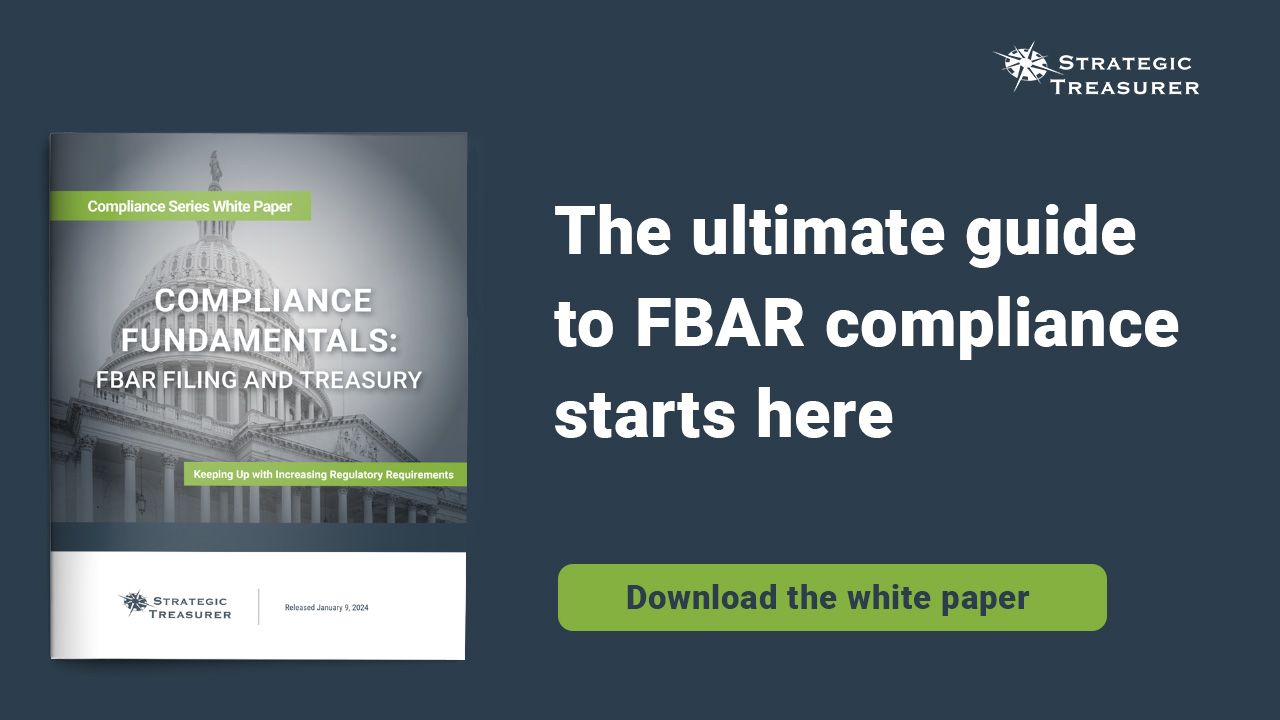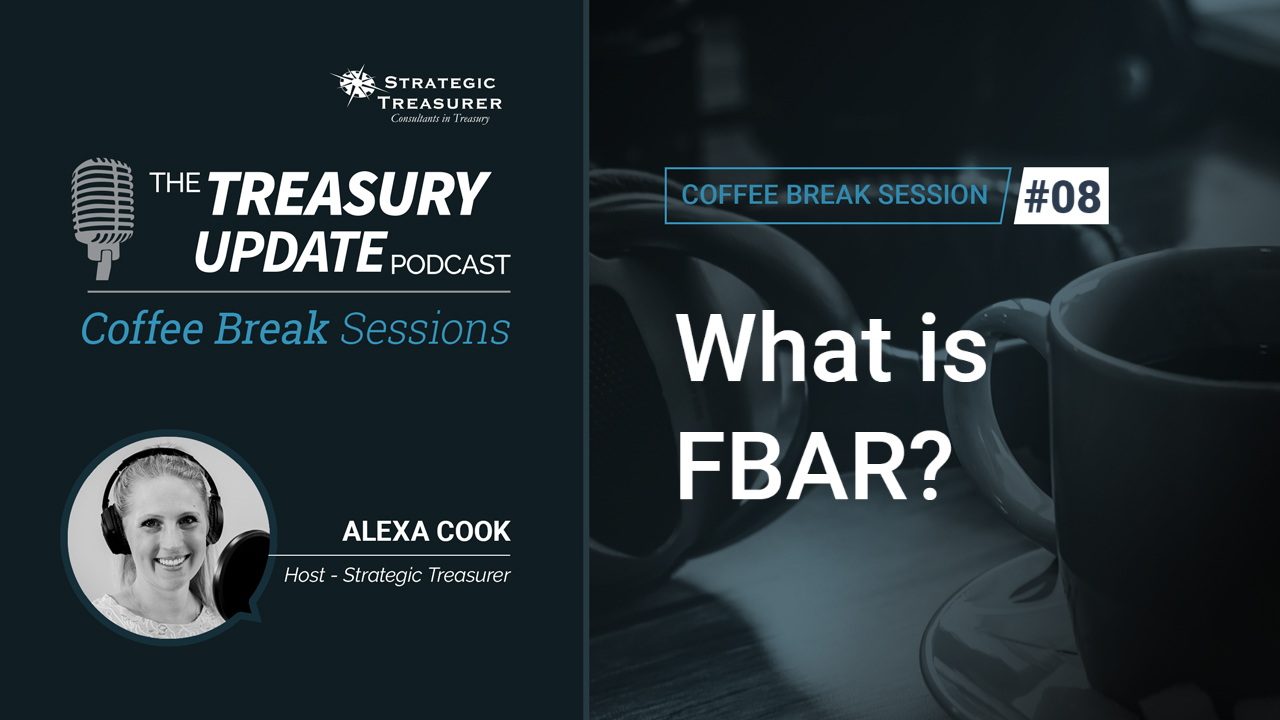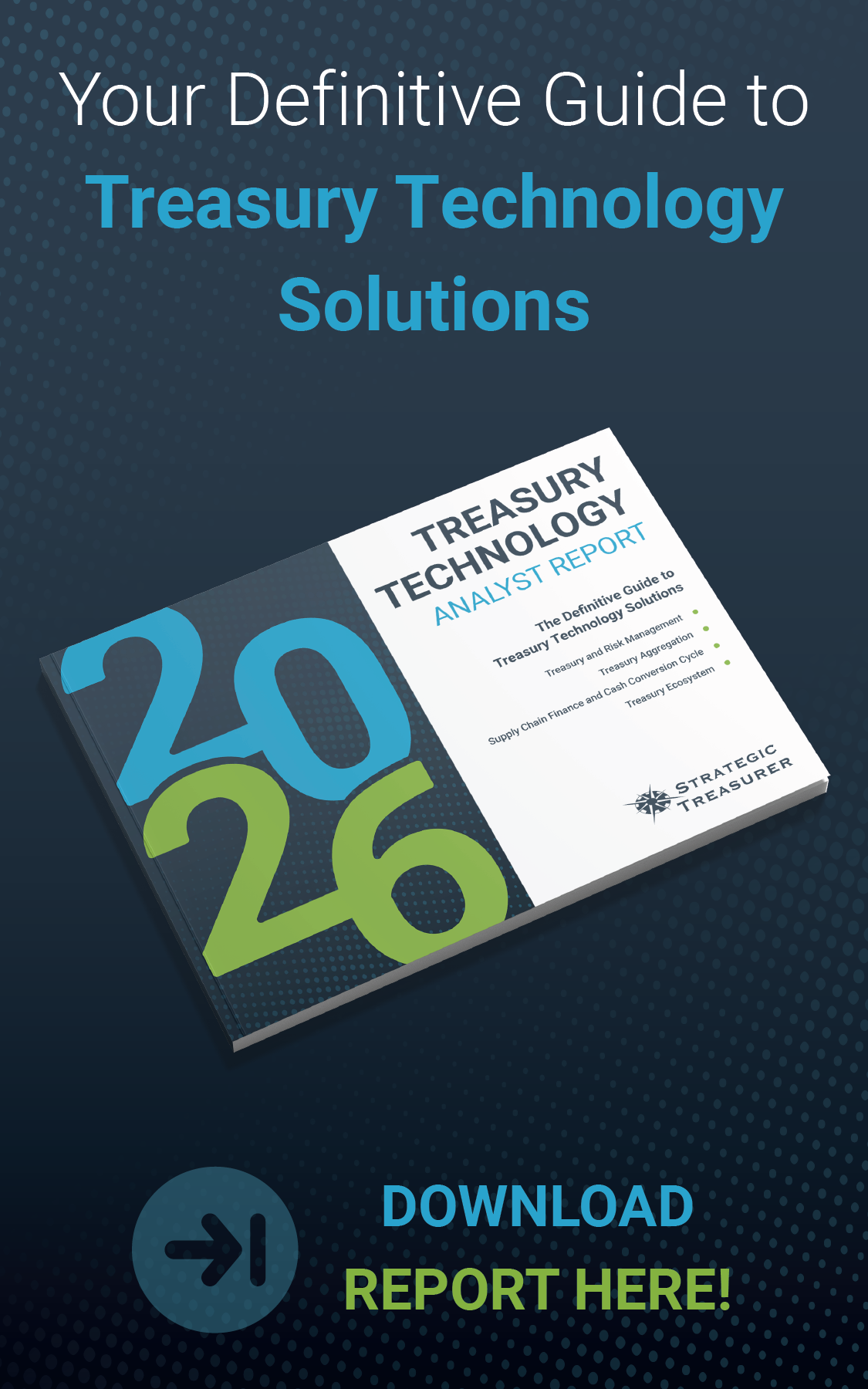
Episode 296
How to Solve FBAR Without Killing Your Team
In today’s episode of the Treasury Update Podcast, Lee Patton and Craig Jeffery discuss various strategies for managing FBAR compliance. They explore the process, challenges, and solutions, from understanding the background and significance of FBAR to exploring options for managing the process.
Download the whitepaper
Sign up for the webinar
Host:
Lee Patton, Strategic Treasurer


Speaker:
Craig Jeffery, Strategic Treasurer


Subscribe to the Treasury Update Podcast on your favorite app!
Episode Transcription - Episode # 296: How to Solve FBAR Without Killing Your Team
Announcer 00:00
Lee, welcome to the Treasury Update Podcast presented by Strategic Treasurer, your source for interesting treasury news, analysis, and insights in your car, at the gym, or wherever you decide to tune in.
Lee Patton 00:19
Welcome to the Treasury Update Podcast. I’m Lee Patton, and I’m on the business development team here at Strategic Treasurer. And although I’m not Craig Jeffery, I do have him here in the room for this unique episode. Today, I’m going to speak on behalf of the corporate treasury and finance teams out there and ask Craig some questions about an annoying but necessary requirement that you will all face. Craig, thanks for joining us.
Craig Jeffery 00:40
Yeah, well, it’s good to be here with you, Lee.
Lee Patton 00:42
Great. It’s good to be here with you. Craig, as everyone knows, it’s tax season, and that means deadlines are approaching for getting some less enjoyable tasks complete. One particular requirement that often looms over the to do list of treasury and finance teams this time of year is FBAR filing or the foreign bank account reporting. Craig, could you just share a little about what FBAR is, who oversees it, who is impacted by it, and why has it become a regulatory requirement for corporations in the United States?
Craig Jeffery 01:09
Yeah, so foreign bank account reporting has been in place for quite some time, and it originally started out with trying to protect against money laundering, putting money in offshore accounts that wouldn’t be reported back to the US so as for evading taxes, and so this reporting would provide a method of capturing that information so that it would be harder to avoid taxes that were owed and due. But with the growth and expansion of terrorism and the country’s focus on fighting terrorism. One way they do that is to track, you know, payment movements and how money may move between shell companies. FinCEN rules that they put in place to follow the law work to protect against terrorism as well. So not just money laundering, but but terrorism. So if there are terrorist activities and you can find who participate in them, you would be able to have a trail back to who was funding that terrorist activity. And so those are a couple of the reasons. You can go to the FinCEN site and see quite a bit information about that, but those are the some of the core elements of why FBAR exists. And so that, you know there’s, there’s still the ongoing need for individuals to file for foreign accounts they have when they have their own financial interest, but there’s also a requirement for companies to file, and it’s been for some time now and then for those who may have no financial interest. So you don’t have a financial interest in a particular account, but you’re a signer, maybe you’re in the treasury group in your assigner on accounts and countries other than where you live or you’re a you know, you fall into the the requirements to report balances and who, who can enact transfers on their own or with other people.
Lee Patton 02:56
Okay, great, that’s, that’s some helpful background. I’m curious about the actual process, though, required to fulfill the requirement, what all is entailed in that process of the FBAR filing?
Craig Jeffery 03:05
That’s a big question. I’ll try to start off really high level, some of the individual requirements and some of the corporate requirements. If you’re a signer for a company, or you have access to the online system and you can initiate or approve, you know, either by yourself or with somebody else, the movement of funds you’re now wrapped up in this and what you have to do is on your on your own personal tax filing. You have to fill out and comply with the requirements for for posting and sharing that information on your forms. There’s also some additional information that you have to file. You’re required to file as an individual for these accounts, and this this activity where you don’t have financial interest, the enforcement’s much more strict and rigorous on the individual side than in the corporate side. Yet the rules do allow for a very vigorous enforcement. So from an individual basis, you have to comply. You have to identify that you’re responsible for it on your tax form, and you have to file those reports. There’s ways to submit those so you would need to submit those to FinCEN. That would be an individual requirement. So there’s a lot there, but I’m saying that very simply, on the corporate side, there’s a responsibility for the corporation or the entity structure that you have to file which accounts, which entities are required. There’s a whole set of rules for what falls under the domain of who has to file. And then you’re filing information about banks, signers, balance, high balance for an account over the course of a year. This information is grouped together, and there’s two there’s two methods of filing it. One is what they would refer to as a smart PDF, where you’re typing information in or doing a lot of copy pasting, and the other is using a file Form. It’s not the most advanced structure layout, but it’s a form where you can put the data in and submit that so in both these cases, the. You know whether you’re using smart PDFs or whether you’re using file format that they have required that has to be loaded into the system. You load into the test system, make sure it works, and then when you do your your final filing, you load into that system. And filers you’re gonna look at, the authorized filers would be, you know, CPAs, lawyers, or some of the tax preparers, according to the IRS definition, that’s really kind of a high level. There’s quite a bit of quite a few steps on the corporate side to to find the data, to identify the signers, to pull that information together, to apply the the exchange rates that FinCEN requires that you use, to determine the levels and then file. And then after everything’s filed, there’s usually a confirmation process to you want to record that and maintain good records in an archive, in case there’s any questions about this, ostensibly, you know, five or six years down the road, you’re going to get questions, and the people that have done that may have forgotten. So it’s really important to close the loop and make sure everything’s well documented, interesting.
Lee Patton 06:03
It sounds like it’s not so much a complicated process, but it does sound it’s sound like it’s tedious and time consuming. Craig, you’ve been advising corporate treasury teams for decades. What are some of the leading practices you’ve seen over the years when it comes to satisfying this and other regulatory requirements? Is there a recommended route to managing these necessary but undesirable projects?
Craig Jeffery 06:25
Well, I think it depends on the particular organization. You know the you can break things out different ways. Do you have a Do you have a sizable treasury group? Is your bank account management process defined and assigned to people? Another way to look at it is, do you want to do certain tasks inside your organization with your resources or outsource those. Have someone else help with those. Those are a couple couple key elements that people need to consider when they say, how do we manage these? I think you said necessary but undesirable. I mean, depends on the process. Right? If you have to do this once a year, it’s a headache, like we have a group that does this, and they find it quite interesting, because they’re doing so much, and it’s you gain familiarity, and some of the challenges become easier when you automate things and manage that. But from a rule of thumb basis, if you have a couple accounts, you sell to file, it’s very simple. You may find it easier to just use the Smart PDF form. Fill that stuff out. If it’s very simple you, let’s say your company with a few accounts, maybe one or two overseas that fall prey to that, and a couple signers. It’s probably going to make sense for you to do that yourself. Might be involved. It might require you staying current on things. But that may may prove to be worthwhile. Now others want someone who’s well versed in it, stay current with it, and so they may not have a lot of activity, but they’re going to want to use a partner who understands the rules, keeps current on it, gives them guidance, can clean the data, test the data, validate the data against last year’s data to make sure you’re not missing information, and then, you know, run the whole process of preparing that for filing.
Lee Patton 08:09
Yeah, that makes sense. Obviously, what you mentioned is important, is that process. And you know the importance of establishing that in house or with a team that, you know, an outsourced team that already has a process in place. I want to dive in just a little bit on both of those options. I know many have been meeting this requirement for years, and some have good process in place that they are happy with, while others remain frustrated and might be looking for a better way to handle the headache. And just thinking about our listeners, there may be some who are dealing with this for the first time, so this will be helpful for them too. Tell me a little more about the typical frustrations people face when trying to manage this process in house with their own team who generally bears that burden. What type of disruptions do they face and what are the major pain points people face with this FBAR filing process?
Craig Jeffery 08:48
Yeah, most people view it as a pain or a headache. I mean, I’ll tell you, we’ve referred to it as the headache removal. Part of our headache removal services, right? There’s just, there’s things that have to be done. They’re essential. There’s a huge risk if you don’t get them right, but they’re a pain because you’re not, you don’t have someone focused on it all the time. It’s usually isolated to certain types of activity. And so who does it, I would say there is a we’ve taken survey and we’ve run polls and surveys and figured out who’s actually doing it. It’s usually divvied up between the tax and Treasury. Treasury always has to participate because they’re providing high balances no matter what. They’re usually keeping track of all the signers, and so they’re responsible for a huge chunk of it tax, if it’s separate from Treasury, may be responsible for tax filing, and usually there’s a bit of a battle not to take on the responsibility, but to push it to the other area. Because who would want to do that, like, Who would want to, you know, to do this filing, to communicate with people, to validate the balance. And send it in. And so it’s a, you know, it’s a mix. And Treasury probably does it the predominant amount of time, probably a little bit over half taxes next. And then there’s some other groups that end up doing this. And this is a, you said, what are the what are the frustrations? Here’s a couple of the frustrations that can come up. Oh, who are the signers? When were they authorized to sign what’s our account list? What’s our high balance for the year? What’s the rate that FinCEN is using that’s like a one element of just on the corporate filing. So answering those questions like getting to that data, usually people quickly find they do a terrible job on keeping track of bank account management, the signers. And the other issue too on this Lee is, you know, a FinCEN signer is not what a finance person would think of as a signer, certainly not what a treasurer would think of as a signer. You think of a signer an account as someone who can, you know, physically sign or has, you know, is, you know, has some kind of signature card on file with the bank. And that is partially true, that is part of the subset, but FinCEN has other signers. We might call them portal users. They refer to those as people who acting on their own or in conjunction with another person, can effectuate or move funds. Now I didn’t quote that exactly, but we would call those, you know, Portal signers, because they may not be, they may not have filled out an authorization form, put a signature, wet signature, on some document, had it scanned or sent in, but they are listed and identified as signers from fincens definition, so they’re included so someone moving money or making an approval, or if they have the permissions to do that, they’re counted as signers. That’s an interesting issue, because now you’re an individual at a company, you have to You’re a signer, and now you have to file your own taxes, so you can file the own tax reporting and FinCEN reporting this requirement required for the, you know, the foreign bank account reporting requirements. So now you have to do that. It’s done for the company. You have to do it. The company can offer to do it on your behalf, and then, as a signer, you can allow them to do it. You have to fill out forms and provide permissioning, and they can file on your behalf, which I think makes the most sense, because it’s a company expense. It’s related to Company Activity. Why do you Why would an individual have to do it? And so what we’ve seen over time is more people are saying, let’s take the headache off of individuals who are moving funds around. A lot of times, it’s finance, staff and executives, and let’s have the company do it, or the company’s outsourced firm who’s managing that handle that activity. Those are just a couple of the pain points when you go and you say, who has to sign like, we don’t have records of when people were active or inactive. Were they an active signer, the beginning of the year, at any point in time in time of the year? Oh, we’re not sure. Or we got them removed on January 2. We thought they were removed in September, but we found out with the bank, it hadn’t been removed. So they were an active signer on January 2. Now they’re responsible for filing for that entire year. And you can say, I don’t think that makes sense, and you can think that, but you now have to file for that whole year. And think about people that leave the organization. Maybe they’re terminated. They took another job, and let’s say the company is slow to remove them. It doesn’t get removed that next year either. So they left in September. They have to file for the next year and the year after, until they’re removed. And they’re like, Why do I have to do this? I’m not at the company. I can’t sign well, they’re listed as a signer.
Lee Patton 13:46
So Craig, that’s interesting to me about those pain points. It sounds like a corporate treasury team needs to be highly organized to be on top of who to contact and who to prepare those filings for. As we all know, treasury teams don’t quite have the bandwidth at times. If a company wanted to reach out to a third party, what do they need to look for and with Strategic Treasurer’s history? Can you talk a little bit about how we have helped corporations clear this yearly burden off their plates?
Craig Jeffery 14:13
You know, there’s a broader question or thought that, you know, and guidance that we give to treasurer bank account, General, bank account management as a category within your overall compliance, you know treasury has to keep track of a lot of this activity. Figure out, what are new regulations, new requirements that are coming up. What are existing ones? What’s changing? How do we make sure we comply overall they tend not to have a significant amount of resources to do extra work at different points in time, as you you know, as you identified, you know, in your in your question, this idea of, how do we identify what’s going on and what, how do we understand what’s coming up, what’s due, as well as, what do we use our resources for? I think it’s really that’s. The key strategic decision the treasurer has to know, have have people monitor what’s going on and what they need to do once something comes in becomes, you know, more rote. And if you have a good process, that tends to be pretty easy to manage. And so some organizations are like, Oh, after a couple years, it’s just like a you know, it’s like muscle memory. You can complete it. What we found on on foreign bank account report, it’s not that it changes so much. Every year there have been changes. They’ve changed the format. They’ve changed different things. That’s one of the things that since we provide that service, when FinCEN makes a change in how files are delivered, the formats that are used, we handle that, so our clients aren’t impacted at all through that, that change, and because they’re not impacted, that’s just like, that’s just one other potentiality, or one other headache that they can avoid. Think of some example in your life where you did something a certain way, and then there was somebody showed you a change, or there’s a piece of technology that made things totally different. And you said, I’m never doing it that way again, if I can avoid it. And think of, I mean, that’s happened all the time. I mean, I can think of how technology has come in place at in the work environment. You know, using a hedge trim, a battery operated hedge trimmer, compared to cutting cords. You know, it’s just like, once you say, Okay, now I don’t have to worry about this or seeing the spark. I’m not doing that again. You know, there’s a potential you can make it work, but it’s terrible. And you can think about, you know, using a saw, using a chainsaw, whatever, that once you start using something that relieves a lot of pain, it’s much better. I mean, there’s always people like Martha Stewart who’s like, I’m going to make my own paper out of wood and use that for my own thank you cards. And there’s people that love doing that, but that’s not, that’s not necessarily how a company, an organization, needs to to manage their businesses. So I say that as kind of a backdrop to, you know, we did this as a favor to a company, like, can you help us do this? And so we did it. It was a favor. And then we got decent at it. So then we talked to other companies, and then we started doing it for them, and got better at handling it. But what we found is, the first company, one of the people left and went to another company, and they had to do this on their own. They’re like, I’m not doing that. And so they called us, and then after a while, someone from that company went to another company and they said, I’m not doing that. Once they saw how it could be done and and that continues. You know, people go to other companies say this is a terrible way to do things. Yeah, you can do it on your own, but why would you if certain parameters are met? So this is not a, you know, everybody should use an outside firm to do that, but it’s pretty it’s pretty difficult to say, I want to have someone who keeps current on all the issues and items that come up. And every time I have a question, I’m going to call FinCEN, wait on the line, get them to provide a response. Do I record it? I make sure that it’s right. Those are significant challenges. The other the other part too, is if you’re going to file on behalf of individual signers in your company, which you should, even if you use a good TMS, some of some of the TMSs have built in quite effective bank account management functionality, and so you can keep track of signers and portal users and the dates when they’re active. So now you have pretty good data, and that solves part of the data problem pretty significantly. So if I look at, do I have the data to have my balances? Maybe I have quite a bit of that information ready. But that doesn’t solve all your problems. That solves a lot of the fundamental messiness behind the scenes. But think about the individual signer. You want to, if you want to, as a company, file for the individual signers to take that headache off their plate, and you do it, you still need to have permission from them. So there’s a process of sending out forms asking for their tax information, having them grant you authorization. I won’t go through the forms names, that information has to be captured. And then now you’re filing on their behalf, and you’re you’re providing confirmation back to them that whole process companies are designed for. Hey, I’m getting permissions. How do I protect all the PII information? How do I do that and manage that process? And so for us, that’s a line of business. For us, we handle that process securely. We don’t PII information is not being sent by email, is not being sent in the mail. I mean, the first days it was sent in the mail, and we had certain ways we were trying to protect it, and then once we were able to get everything to be done digitally, fully encrypted, never exposed, that made life a lot easier for us. But the whole time, it took it out of a company’s list of challenges. It’s like you have a lot of things to be done, and there’s not processes set up in companies to handle all that. The tools that exist help with the quality of data that really speeds the process and helps the companies. But when you get to the filing side, it’s not just Can my system create a report, but am I compliant? Am I reviewing things year over year, etc? So we found. Found that the fact that we compare, who are the signers, what were the accounts that were signed for last year? What’s changed? What’s different? Is there anything that’s a discrepancy? We handle the whole process for the individual signers. We’ll take the data, review it, we’ll also not only compare it to prior years, but we’ll also run it through the FinCEN test system, and it will provide the setup. And then after that, how do you maintain this data? Because you have to maintain this data for six years. We maintain it longer than that for companies, but we put it in an archive make sure they have access to it. But since it has PII information also has to be very secure and very locked down, so that you don’t have multiple, multiple people accessing, being able to access that type of information. So those are some of the the reasons, Lee, why, you know, why people use an outside service. We also get questions all the time, is this person a signer? This person has power of attorney? Are they a signer? Well, they have power of attorney. They could sign, but they would have to gain signature capability at the at the bank, they have the ability to sign, to approve signers on accounts. Are they signers? No offense? Says no, because they’re not currently signers. If they assign themselves, or if they are assigned the rights, then they become signers. So there’s all these rules. You don’t want to include people that don’t need to be included, and you certainly don’t want to exclude people from signing that need to be included, because there’s penalties. So being able to manage that process effectively makes people sleep a whole lot easier.
Lee Patton 21:36
That’s really great information and perspective, Craig. I tell you what your analogy with the trimming hedges and the extension cord that brought back nightmares from my teenage years. Given that we were only six weeks out or so from fednow filing deadline this year, I know we’ve put together an incentive for corporate treasury teams who are looking for some relief on the FBAR front. What is Strategic Treasurer offering between now and April 15?
Craig Jeffery 21:59
Well, this is, the incentive is not because the deadlines coming up in April, because it’s not a it’s not a sense of, it shouldn’t be a sense of fear that I’m going to miss, because there’s an ability for an automatic extension. So it’s automatically extended, so you have more time, not a lot. You have until October 15. That doesn’t mean don’t put off to tomorrow, which you can put off to October 15. It’s probably not a good motto, but you have time to do it. And the reason we’re offering an incentive, in terms of anyone who’s looking or would consider FBAR filing, we would provide a scorecard for your bank fees. So if someone looks at that, we’re going to review it a scorecard. We have other services there, so it’s not completely altruistic, but you can just use a scorecard that can help you in a number of different ways, but that also may lead to other services, and that seems to be a low risk way for people to get something of value as an additional motivation. And what’s helpful for us is, you know, we continue to grow this, and this will bring more people into you know, have a discussion. Your decision could easily be, no, we want to keep doing it ourselves, or we’re going to make tax do it, or whatever the situation is, or it might be, hey, we do want someone to do this for us. Keep it organized and see, hey, this is, this is causing us a lot of pain, and it doesn’t cost that much to have someone else do that for us, effectively, accurately, you know, we can’t put it in the right format, so we have to copy and paste things into this PDF, you know, copy, you know, 39 accounts and all these information about the banks and the bank accounts and signers and their tax IDs. Now, you know that could be handled through, you know, automation. So those are a couple things there leave for, for what makes sense, the having a scorecard of your bank fees. It won’t provide comparison everything, but I’ll provide a scorecard. Where are you? You an A, A, B, A, C, A, D or an F. We have a massive database. We’ve managed bank fee data for for a really long time, we have 1000s of analysis statements. So this is really helpful. And so we use, you know, our services called Feenix Spend Management Solutions, or Feenix SMS. F, E, E, N, I, X. And this is a great way to look to see where, where are you, and is there something else you might need to do on the fee side? Because that’s that’s still in the broader domain of bank account management and relationship management. One is compliance for foreign bank account reporting. The other is related to the share of wallet relationship side and how you compensate your bank. So you know, that’s just a way of let’s talk about it. And there’s something for your for your effort there, just to provide an additional incentive.
Lee Patton 24:47
Sounds great. And that’s that’s a very valuable offering for our corporate treasury teams there. I know that we plan to go a bit more in depth next month on an FBAR focused webinar. I believe that’s going to be. Scheduled for April 4 at 2pm Eastern. Just want to let everyone know this webinar be a chance for folks to get down into the details on tactics for handling the process, both internally and when we when, when you leverage a third party. So if you’re interested in learning more about the best way to organize the process, then visit StrategicTreasurer.com/FBAR2024 to reserve your spot for that event. Lastly, Craig and the Strategic Treasurer publication team have put together a white paper that lays out many of the details that you will need to consider in satisfying this regulatory requirement. If you’d like to download your free digital copy of that report, please visit StrategicTreasurer.com/FBARpaper.
Craig Jeffery 25:39
Thanks, Lee, appreciate it. You know when you talked about the the links, the the two were, they’re both strategictreasurer.com/FBAR2024 and FBARpaper. So those are pretty easy to remember. Thank you, Lee.
Announcer 25:55
You’ve reached the end of another episode of the Treasury Update Podcast. Be sure to follow Strategic Treasurer on LinkedIn. Just search for Strategic Treasurer. This podcast is provided for informational purposes only, and statements made by Strategic Treasurer LLC on this podcast are not intended as legal, business, consulting, or tax advice. For more information, visit and bookmark StrategicTreasurer.com.
Related Resources
FBAR White Paper Reporting foreign bank and financial accounts is not something that can be ignored. Neglecting it can result in massive fines.
Download this white paper from Strategic Treasurer for information on FBAR filing.







